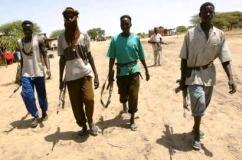Full Sudanese peace talks get off to a shaky start
ABUJA, Oct 25 (AFP) — Peace talks on the conflict in the Sudanese region of Darfur ran straight into trouble on the first day of formal negotiations Monday as angry rebel leaders refused to sign an agreement to protect civilians.

|
|
Members of Sudan Liberation Army walk with their rifles at Ashma village 30 km (19 miles) from Nyala, south Darfur, October 6, 2004. |
Rebel field commanders also briefly boycotted a side meeting on the security situation in Darfur, refusing to sit face-to-face with government officials as African Union mediators struggled to keep the Abuja conference on track.
Meanwhile, both sides swapped allegations of ceasefire violations, in exchanges which held out the prospect of many more difficult days over coming weeks as delegates seek a way to resolve the region’s 20-month-old conflict.
AU mediators had hoped that both sides would sign a “humanitarian protocol” which was drawn up last month to guarantee the protection of international aid workers and Darfur’s 1.5 million displaced civilians from militia raids.
Neither side opposes the wording of the document, but on Monday rebel leaders refused to sign it until the sides have reached an agreement on a second protocol on security and the demilitarisation of the conflict.
Then, when AU officials set up an ad-hoc committee to negotiate a security deal on the margins of the conference — allowing most delegates to concentrate on a seeking a political settlement — rebel leaders staged a brief walk-out.
“The AU wants us to sign the protocol on humanitarian issues, but we said no. We will not sign it until the issue of security is thrashed out,” said the leader of the rebel Justice and Equality Movement (JEM), Mohammed Tugod.
The Sudanese Liberation Movement (SLM) backed its ally’s stances seconding the JEM’s demand that Khartoum agree to a no-fly zone over the province.
The rebels claim that civilians are still falling victim to government air raids, despite a much violated ceasefire accord dating back to April this year.
For its part, the government wants the security deal to include the demobilisation and eventual disarmament of the rebels, an idea the insurgents have vowed to reject until they win a broad political settlement, including greater autonomy and a better share of Sudan’s oil revenues for Darfur.
“We urge our brothers in the (rebel) movements to sign the protocol on humanitarian issues because we are ready to sign it now. Now that they’ve refused, I hope that they will not further delay the work of the security committee,” said a spokesman for the government delegation, Mohammed Ibrahim.
Meanwhile, the rebels accused the government of continuing its air strikes.
“This is part of government’s policy to eliminate the black people of Darfur and it shows that they are not sincere about restoring peace to the region,” Tugod said, claiming that 7,000 people had fled the eastern Darfur town of Alaiet over the past three days due to aerial bombardment.
Ibrahim confirmed there had been an incident in the town, but blamed the rebels for any deaths.
The United Nations estimates that 1.5 million people have been driven from their homes during the conflict and that 70,000 civilians have been killed in the past 20 months since two rebel movements launched an uprising in Darfur.
The insurgents alleged that Darfur’s black African tribes have been politically marginalised by the Arab-led regime in Khartoum.
Khartoum responded by unleashing the Janjaweed, an Arab militia which attacked civilian communities suspected of supporting the rebellion and triggered what the United Nations has described as the “world’s worst humanitarian disaster”.
African leaders are determined that the Abuja talks will produce enough progress to convince the international community that their continent is at last ready and able to resolve its own problems.
The UN Security Council is to hold a special three-day session in the Kenyan capital Nairobi from November 18. The world body has previously threatened to impose economic sanctions on Khartoum if the killings continue.
The talks were due to restart on Tuesday with negotiations on the political situation, delegates said. It was not yet clear whether rebel leaders would eventually agree to face-to-face talks on the security protocol.
